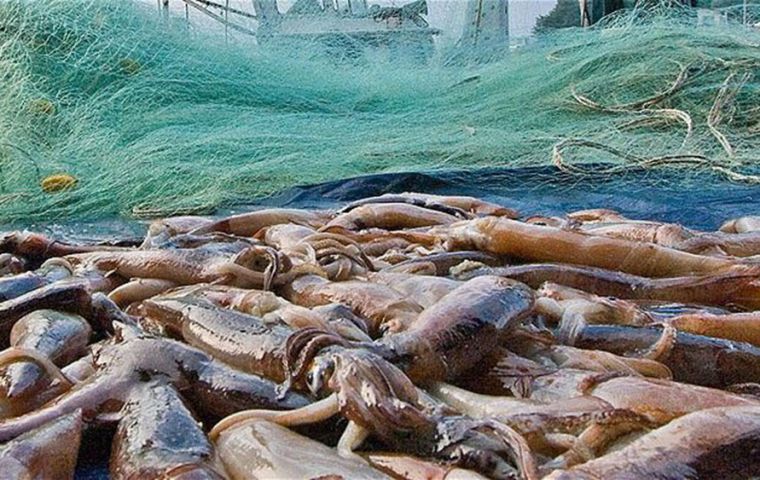MercoPress. South Atlantic News Agency
Falkland Islands fisheries review recommends ITQs for Illex squid
 The report recommends the Illex fishery be brought into the ITQ system, with 60 to 75% of ITQ assigned on historical catches and the remainder up for tender.
The report recommends the Illex fishery be brought into the ITQ system, with 60 to 75% of ITQ assigned on historical catches and the remainder up for tender. Moving the Illex fishery into the ITQ system and improved catch verification requirements are among the recommendations made by an independent review of the Individual Transferable Quota (ITQ) system published by the Falkland Islands government, FIG, this week.
The review, carried out by New Zealand-based consultancy Terra Moana, makes ten recommendations on the efficacy of the ITQ system, as well as introduction of the illex fishery in to the ITQ system.
In addressing the ITQ system, the report calls on FIG and the fishing industry to seal a Fisheries accord that sets out a common vision for fisheries, and balances the two parties’ needs.
For FIG, those include retaining control of the country’s natural resources and ensuring that the resource is being sustainably fished. Industry’s needs focus on certainty of access and fair access fees.
The report stresses the importance of FIG retaining control of the resource, and concludes that the 25-year license term remains preferable to in-perpetuity rights.
Tests for license-holder
It recommends that roll-over of the 25-year term be subject to the license-holder having passed key performance indicator tests. It does, however, recommend that a new 25-year period could be set if an ITQ holder were to present an appropriate investment strategy.
In order to better define what those performance tests may be, the report recommends that industry and FIG develop a set of criteria surrounding effective control, active involvement, and economic efficiency.
It recommends that roll-over of the 25-year term be subject to the license-holder having passed key performance indicator tests. It does, however, recommend that a new 25-year period could be set if an ITQ holder were to present an appropriate investment strategy.
In order to better define what those performance tests may be, the report recommends that industry and FIG develop a set of criteria surrounding effective control, active involvement, and economic efficiency.
The report notes that there has been “some criticism” that the tests, which underpinned the rationale for the ITQ system, “have not been applied rigorously since the introduction of the ITQ system.”
ITQ for Illex
The report further recommends that the Illex fishery be brought into the ITQ system, with between 60 to 75% of the ITQ being assigned on historical catches and the remainder being put up for tender. This, the report argues, would allow “new entrants the opportunity to be involved.”
A move towards a total allowable catch as opposed to total allowable effort is recommended for the finfish fishery.
The move would “allow greater focus on sustainability ...and immediately increase the trading market,” the report maintains.
Harsher penalties
Further emphasis is put on catch verification, and recommendations are made for FIG to review not only catch verification and reporting requirements, but also “introducing harsher penalties for under or misreporting of catch immediately.”
“Given the increasing demand by the market for verifiably legal product and government moves to implement systems to improve verification, it would not seem unreasonable that current Falkland Islands regulations are reviewed as part of this wider strategic review process,” the report goes on to say.
The report also invites consideration of the current aggregation limits - limits as to how much of a given fishery quota a single company can hold - arguing that they are limiting growth in the sector.
No major changes were recommended for the toothfish and loligo fisheries, though consideration of a move towards “a catch based management approach” for the latter is advised.
‘Falklands fit is key’
Referring to the report, MLA Barkman told Penguin News that, “no sweeping changes” would be made until their effects were understood, adding “unlike many other countries we have an economy that is very largely dependent on fishery, so finding best ‘Falklands fit’ is key.”
Director of Natural Resources, John Barton, said there is a process in place to work through the recommendations with FIG and FIFCA that “may result in some adjustments in fisheries management and the ITQ system.” (Penguin News).-




Top Comments
Disclaimer & comment rules-

-

-

Read all commentsArgentina's Continental Shelf Claims and The UN CLCA Commission (1 page):-
May 25th, 2018 - 10:16 am 0https://www.academia.edu/33898951/Argentinas_Continental_Shelf_Claims_-The_UN_CLCS_Commission
And what does international law say about the ownership of natural resources?
itq for the other fisheries should also be disposed of by tender. it was obscene that a few select people were granted rights worth millions of pounds. like any other public assets itq should be sold by tender or auction to ensure the public purse gains the most benefit in the public interest subject to the normal condition that fig does not bind itself to accept the highest or any tender. what justification can there be to dispense with the tender process and distribute valuable public assets to a select few?
May 26th, 2018 - 07:29 pm 0do some research portman. Was all divided on historical catches to the folk who had been buying the same licenses for years. now we have some of the highest license fees in the world. your eyes look very green
May 29th, 2018 - 02:14 am 0Commenting for this story is now closed.
If you have a Facebook account, become a fan and comment on our Facebook Page!